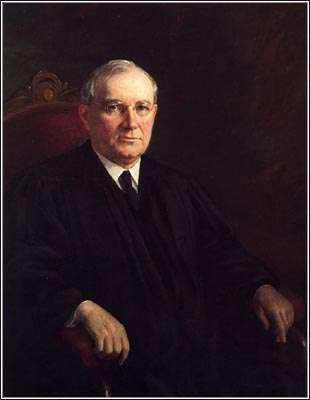The Volokh Conspiracy
Mostly law professors | Sometimes contrarian | Often libertarian | Always independent
Today in Supreme Court History: November 16, 1939
11/16/1939: Justice Pierce Butler dies.

Editor's Note: We invite comments and request that they be civil and on-topic. We do not moderate or assume any responsibility for comments, which are owned by the readers who post them. Comments do not represent the views of Reason.com or Reason Foundation. We reserve the right to delete any comment for any reason at any time. Comments may only be edited within 5 minutes of posting. Report abuses.
Please to post comments


The sole dissenter in Buck v. Bell.
Sadly, he didn’t write an opinion explaining his dissent.
I think he burned his papers. So much for an in depth biography.
He didn’t have a bunch of quotable quips.
Nor a coterie of professors who hung on his every word.
And his defense of property rights was at a time when that was the opposite of the route to a positive reputation.
It’s as if he *wanted* be be comparatively obscure.
Wow....that alone makes him remarkable = The sole dissenter in Buck v. Bell
Louisville & Nashville R.R. Co. v. Mottley, 211 U.S. 149 (decided November 16, 1908): defendant's assertion of defenses based on federal law does not create federal court jurisdiction (I remember this one from law school; a couple guaranteed lifetime passage on a railroad in consideration of settling a personal injury case sued 35 years later when their tickets were no longer being honored)
Hardy v. Harbin, 154 U.S. 598 (decided November 16, 1874): Was John Hardy the same as Thomas (or Tomas) Hardy (an assumed name) to whom the Mexican government had granted land in 1836 as a reward for his war service? At issue was a claim to the land (which by then was in Texas) by John's grandchildren. The opinion sifts through testimony as to sightings of John or Thomas at various times and places, physical descriptions, statements as to owning land, whether a signature was validly recognized, etc. The opinion summarizes "3000 folios of testimony" which could be made into a TV series (like "The Fugitive"), or at least a board game. The frontier encounters and the piecing together of a mystery remind me of the Hillmon case. Anyway the Court examines the facts found by the trial court and affirms its finding that it was not the same man.
Bell v. First National Bank of Chicago, 115 U.S. 373 (decided November 16, 1885): by custom and practice three days' grace is allowed for payment of "foreign bill of exchange" (i.e., can't sue on it until days of grace are over)
He was from St. Paul. A fairly prominent street there is named for him. Pierce Butler Route. Well, it's more of a railroad frontage road. But if you're looking for free pallets in St. Paul, you just might wind up on PBR.
Butler is generally regarded as a relatively minor figure in Supreme Court history. Despite being a lifelong Democrat, he was appointed to the Court by Republican President Warren Harding in 1923.
He was the sole dissenter in the infamous case of Buck v. Bell (1927), in which the Court upheld a Virginia statute allowing for the involuntary sterilization of the "feebleminded". Butler's dissent, without opinion, is usually attributed to his staunch Catholicism.
Butler's Catholic morality may also have been on display in his opinion in Hansen v. Haff, 291 U.S. 559 (1934), another case in which he was the lone dissenter.
Hansen was a citizen of Denmark admitted to the United States in 1922, taking up work as a housekeeper in Los Angeles. In 1925 she commenced an affair with a married man. The Court noted that she did not live with him, nor did he support her, though he would occasionally buy her gifts. In 1931 Hanson and her paramour travelled to Europe. They returned to the United States through Canada and checked in together at a Seattle hotel, registering as man and wife. She was arrested in Seattle by immigration officials who sought to deport her based on a statute forbidding entry to the United States by anyone "for the purpose of prostitution or for any other immoral purpose". The Court held that resuming her livelihood, not continuing the affair was her primary "purpose" for entering the country, and that "immoral purpose", in the context of the statute meant an act akin to prostitution, and mere "concubinage", as the government alleged, was insufficient.
Butler did not agree.
at 563-65 (Butler, J., dissenting)
Well, then, later than that.
Hypothetical? Not for long.
Thanks. I noted this case on May 27.
By Sanford’s reasoning, male Quakers, who really would be subject to conscription, are properly deported, the whole lot of them.
I saw nothing in Rosika Schwimmer's life story to indicate she was a Quaker.
Justice Holmes *compared* her to a Quaker in order to make his snarky point, but he wasn't calling her a literal Quaker.
You quoted Sanford and the 2nd Circuit who thought it was a "hypothetical question" - which it probably was...in 1929.
The Schwimmer case was overruled in Girouard v. United States (1946)
https://supreme.justia.com/cases/federal/us/328/61/
A sympathetic petitioner - willing to get shot at in the Army and to provide medical care to soldiers, but not to do any shooting. Nothing wrong with *his* attachment to the Constitution.
Congress got into it in 1952 by exempting pacifists from the bearing-arms provision of the naturalization oath, and exempting them from all military service if their pacifism was that strong. It's on the applicant to prove sincerity.